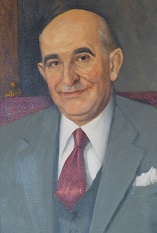History
In the financial sector, the past has an unparalleled importance in determining the present and providing solid guarantees for the future.
It was the 19th century and the memory of Napoleon’s military campaigns was still fresh in the minds of Europeans. The world was becoming well aware of the effects of the Industrial Revolution as the economies of Europe, the Mediterranean and North America flourished, all thanks to major inventions - the steam engine and electricity - and the movement of ships, caravans and now railroads that transported and sold agricultural products and the most diverse merchandise.
Financing for this intense commercial movement came from bankers, who would one day become legends. Families like the Rothschilds in Europe, the Rockfellers later in America and the Safras in the Middle East began a lineage of financiers, laying the foundation for modern banking based on improved communication and the growing demand for trade between cities.
Particularly intense was the exchange of merchandise between the ports and cities of Europe, such as Paris, Nice, Marseille, Madrid, Barcelona, Naples, Trieste, Genoa and Venice with cities like Alexandria, Athens, Istanbul, Beirut, Damascus, Aleppo, Haifa, Tel Aviv and Jerusalem. In this region of the Middle East, members of one Jewish family, known for a long tradition of dedication to financing in gold, earning them, in turn, the Arab name for the color of the precious metal: Safra.

One of the major centers of trade was Aleppo, a city in northwestern Syria. It was there that merchants and goods from the East and West converged. The city was also home to the Safra family, who with their cosmopolitan vocation financed trade and exchanged currencies from several different countries in Asia, Europe and Africa, including the Ottoman Empire’s “para”, the Venice’s “zecchini” and the Maria Theresa’s “thaler” as well as precious metal like silver and gold mainly. In Aleppo, Jacob Safra, the patriarch, was known for his exceptional ability to mentally calculate the conversion of several currencies as well as the financing costs for each and every one of his clients.
“If you choose to sail upon the seas of banking, build your bank as you would your boat,
with the strength to sail safely through any storm.” Jacob Safra
In the mid 19th century, Safra Frères et Cie. was founded in Aleppo, a bank bearing the name of the renowned family. In no time at all. the institution earned fame and prestige throughout the Middle East, building a solid reputation as highly selective financiers. Safra Frères et Cie.’s strong expansion prompted the family to open branches in Istanbul, Alexandria and Beirut.
Later, in the first half of the 20th century, Beirut was chosen to be the headquarters of the Jacob Safra Bank, founded by the patriarch of what would later become another generation of successful bankers. After World War II, Jacob Safra expanded his business to Europe and later to Latin America and the US.
His offspring likewise gained prominence for their expertise in banking, continuing a long-standing relationship with a community of clients. Today, several of Jacob’s grandsons continue the Safra family tradition in diverse economic areas throughout the many countries where Safra Group thrives.